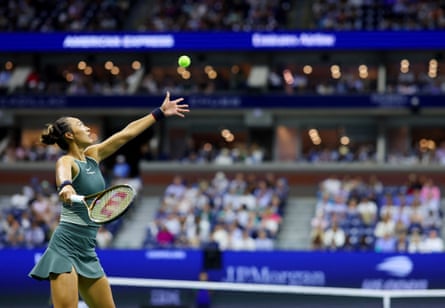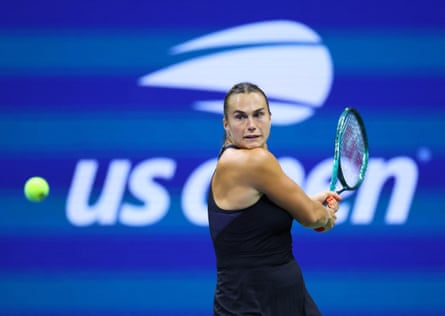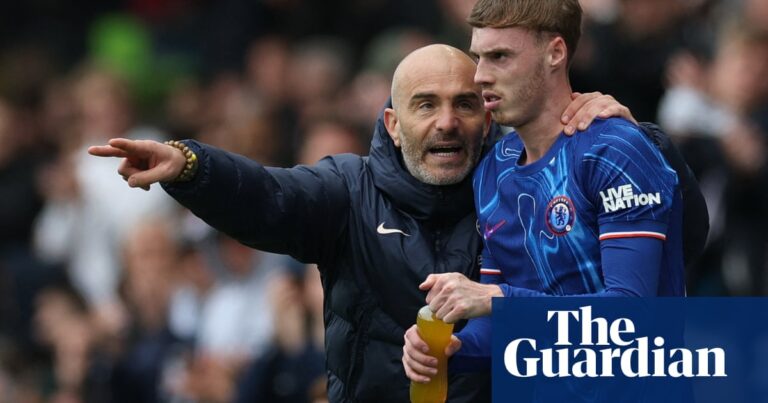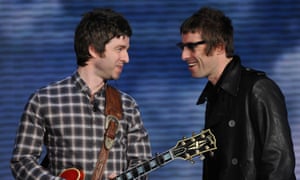When Aryna Sabalenka first emerged on the professional tennis circuit, it would have been a profound understatement to describe her as inconsistent. She was raw and incredibly volatile, blessed with so much power that she could only occasionally control. At times, Sabalenka seemed as likely to hit the back fence as she was to successfully outhit an opponent.
The Belarusian’s evolution in recent years has been remarkable and she has gradually become one the most reliable performers at the biggest tournaments in the world. She continued to show her consistency late on Wednesday in New York by making a mockery of one of the most highly-anticipated matches of the tournament so far, bulldozing the Olympic gold medallist Zheng Qinwen 6-1, 6-2 to return to the semi-finals of the US Open.
Since the 2022 US Open, Sabalenka has reached the semi-finals or better in seven of the last eight grand slam tournaments she has competed in, with the anomaly being a quarter-final at the French Open. A finalist in New York last year, where she lost to Coco Gauff, Sabalenka has now also reached the semi-finals or better at the US Open in each of the last four years, the first player to do so since Serena Williams between 2011 and 2016.
“Honestly, before, I didn’t even know how to manage that pressure,” said Sabalenka on her many semi-finals. “On those days off I would think too much about tennis and I would just waste my energy on that.
“Nowadays, I’m just trying to take things easier. [It’s] just tennis, you know. I’m just trying to bring my best tennis every time and just trying to fight for it, and I know that no matter what’s going to happen on the court, I’m going to fight for it. If it’s meant to be, it’s going to happen.”
This run is particularly significant after some tough periods this summer. Sabalenka had reached six consecutive grand slam semi-finals until she was clearly struggling badly with illness during her quarter-final loss to Mirra Andreeva at the French Open. At Wimbledon, Sabalenka was then forced to withdraw on the eve of the tournament due to a shoulder injury and she has had to gradually find her form again during the North American hard court swing. Between winning the Cincinnati Open then returning to the semi-finals of the US Open, she has found her best form again.
Despite how reliable and imperious Sabalenka has become in the big tournaments, this was still a massive disappointment from Zheng as she failed to put Sabalenka under any real pressure, which was also the case in their Australian Open final at the beginning of the year. While Zheng struggled in the aftermath of her maiden grand slam final, she had been playing with a striking self-assurance in New York since her triumph in Paris and whirlwind celebrations in China.
Zheng had particularly been in devastating serving form, firing 49 aces in four matches and winning 80% of her first serve points. But her service motion is also unconventional and hitchy, meaning her serve is devastating when it lands in but her first serve percentage is often low. She finished with 44% first serves in.

In her opening service game, Zheng missed five of her first six first serves, allowing Sabalenka to eviscerate her second serve and immediately break her. That game set the tone for the rest of the match as Sabalenka struck the ball sweetly off both wings, she rushed Zheng’s big swings with her immense weight of shot and depth, served extremely well and remained laser-focused until the end.
Not even the announcement that Roger Federer was in the crowd, and the subsequent standing ovation he received, could shake Sabalenka’s focus. “I was like, ‘OK, I have to play my best tennis so he enjoy it,” said Sabalenka. “I have to show my skills, you know, slice skills, come to the net and all that stuff. That was a nice moment. Nice to see him around.”
Although this was a disappointing performance from Zheng, there are some mitigating circumstances for the 21-year-old. She has reason to be frustrated with the tournament organisation after her epic, high quality tussle with Donna Vekic, a rematch of the Olympic final, ended at 2:15am on Monday morning as the latest women’s match in the history of the US Open. Zheng said the late night had significantly affected her preparations as she only got to sleep just before 5am on Tuesday.
“Of course affects [me] a lot,” she said. “Especially I couldn’t sleep after I finished the match 2:30 in the morning. This affected [me as] I’m not able to practise yesterday, because yesterday I was feeling terrible. I couldn’t wake up. I even wanted to play tennis, but I don’t feel I could do it.”

Sabalenka will next face Emma Navarro, the 13th seed, after the American reached her first grand slam semi-final with a 6-2, 7-5 win over Paula Badosa of Spain. As against Gauff, Navarro, the 13th seed, produced another extremely solid and polished performance under pressure, maintaining excellent depth and shot tolerance off both groundstrokes in the decisive moments. After trailing 1-5 in the second set, Navarro reeled off six games in a row against a poor Badosa.
Navarro is the daughter of the billionaire businessman Ben Navarro, who is the owner of Credit One Bank, meaning the last two American women in the draw, Navarro and Pegula, are both children of billionaires. After her win, Navarro thanked her father:
“I think he saw a vision from the time I was really young,” she said. “He knew maybe I was a bit ADHD or something to be sitting in a classroom or a 9 to 5 [job]. He saw something in me from a young age. So thanks dad for sending me on this journey.”
Before she knew whether or not she would face Sabalenka or Zheng, Navarro reflected on her criticism of Zheng after their match at the Olympics. She had told Zheng during their handshake that she does not respect her before later describing her as “cut-throat,” which some tennis fans have turned into a complimentary nickname for Zheng. Navarro has never actually explained what her issue with Zheng is.
“I don’t want to go super into the weeds with it, but I think during that match and on the practice court and the last few times I’ve played her, because we have been playing each other since we were juniors, I felt just a little bit disrespected by her,” she said. “I don’t want to go too into detail with it. But I think she didn’t necessarily treat me or the sport with respect. That’s why I said what I said after the match.”
Source: theguardian.com


















